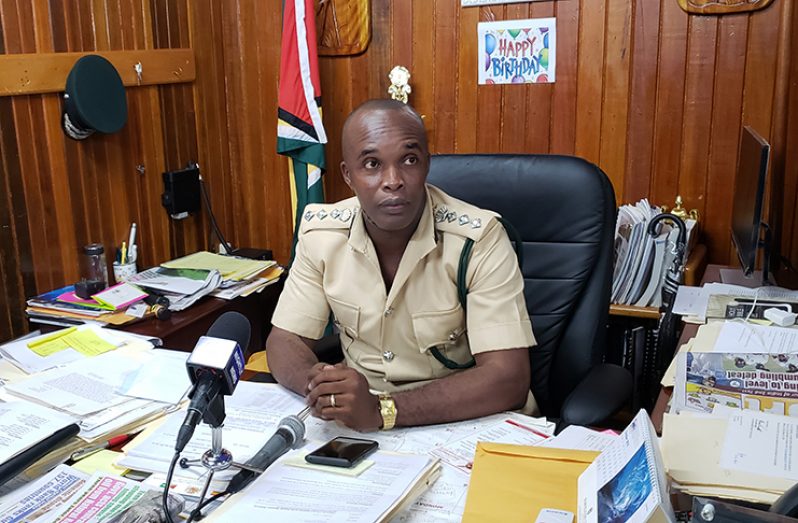…says good support, opportunities contribute to positive changes in inmates
SOCIAL intervention and support, combined with punishment and encouragement are much more effective in preventing crimes, and if an inmate is not exposed to opportunities that contribute to positive changes, leaving prison and returning to a life of crime would likely be their first option.
This is according to Director of Prisons (ag) Gladwin Samuels in his remarks at the 36th Anniversary Church Service hosted recently to observe the Guyana Prison Service (GPS) week of celebrations.
The GPS celebrated its week of celebrations under the theme: “Changing Lives: One Inmate at a time.” He explained that due to the mostly poor conditions within prisons, and the lack of sufficient opportunities for change, most inmates will return to society hardened; having been exposed to an environment dominated by more experienced criminals, they will be savvier and more likely to offend again.
However, he said several criminological studies have shown that harsher sentences do not necessarily act as deterrents, and may even slightly increase the likelihood of repeat offending. The Prison Director said it is the view of the GPS that efforts at punishment without rehabilitation condemn an individual to an existence without hope.
“An existence without hope will invariably lead to recidivism and a life of crime that will further jeopardize our individual and collective security. Our revised laws have not yet been passed to see the GPS move formally to a fully correctional institution. In our existing laws, however, there are sufficient guidelines that allow us to make rehabilitation a critical part of our mandate. This is an ongoing exercise,” the Director explained.
He underscored that with the support of the Ex-Prison Officers’ Association, sister services, religious organizations, businesses, members of society, Prison Boards, visiting committees and budgetary approvals from Government the Prison administration embarked on programmes to rehabilitate and re-integrate law breakers.
He said that over the last 12 months, in the various prisons, 1074 inmates continued their exposure to skills training. He said some of the training includes: Agriculture, Barbering, Block Making, Carpentry/Joinery, Culinary skills, Electrical Installation, Landscaping, Leather Craft, Tailoring, Welding, and Work Readiness.
“Academic training in CXC Mathematics, and Literacy and Numeracy have been curtailed somewhat as we are still feeling the effects of the 2016 and 2017 turmoil,” he noted.
Additionally, psycho social training continues in: Anger Management, Domestic Violence, and Drama. “We saw the trial run for the Sycamore Tree Project, a bold initiative which seeks to initiate some positive interaction between victims and/or their families and the offenders, and ease their reintegration into society. As I stated on a previous occasion, the stark reality is that interaction between victims and/or their families, and offenders, will not be easy. It requires steps that were never taken; it requires dialogue that is open and respectful; it requires a certain level of trust and spiritual maturity,” he said.
“That can present some challenges. Why the Sycamore Tree? The sycamore tree symbolises strength, protection, eternity and divinity,” the Prison Director asserted.
Samuels said that the Administration of the GPS embarked on aggressive programmes that seek to bridge the gaps between crime, punishment and rehabilitation.
He said that the theme seeks to highlight efforts to change existing behaviour, provide job training and provide a support mechanism to increase the chances of success for rehabilitation.
“Crime, punishment and rehabilitation -unfortunately – are basic ingredients found in every society from the moment man endeavoured to organize and live communally. That recipe has bedeviled social scientists, psychiatrists and counselors for centuries. The very notion of these three – crime (with its concomitants punishment and rehabilitation) – is reflected in the teachings of various religions, and in our Constitution,” Samuels said.
In the article entitled: “Recidivism and Rehabilitation of Criminal Offenders”, the Prison Director said research has shown that “one of the prevailing schools of thought is that the severity, unpleasantness and social stigma of life in prison may serve as deterrents to future criminal behaviour, promoting the principle that ‘crime does not pay’.”
He said that the degree of success of these programmes has been mixed. But the GPS still forges ahead. While most of the inmates seem to be doing their part, he said the incontrovertible truth is that, whatever form any initiative takes, it requires the total commitment of all stakeholders for the exercise to be successful.
Success, he said hinges on the collaboration of the prison authorities, civil society and the judiciary. “Inmates will receive behavioral counseling and job training in the various disciplines mentioned previously, so that on their release they can support themselves, and for some, their families,” he noted.
However, he added that civil society can ease their re-entry by not stigmatizing them, and providing opportunities for optimum employment wherever possible. “Families will have to provide the necessary support systems so they are not pressured to return to a life of crime. It will also require the continued resources of our Ministry of Social Protection – one of our major supporters – to monitor inmates’ compliance with the terms of their release,” the Prison Director noted.
He explained that any programme that seeks to invest in an offender’s future relieves the pressure of crime countrywide and enhances security.
“Every successful person that is returned to society provides a safety net for families, and reduces the work of the Joint Services. We are poised, as a nation, to enter an unprecedented period of nation building and prosperity, so we must utilise all possible approaches to secure our country. The in-country population is very small. Therefore, the input from all of us is essential to realising the required level of success,” the Director said.




.png)









